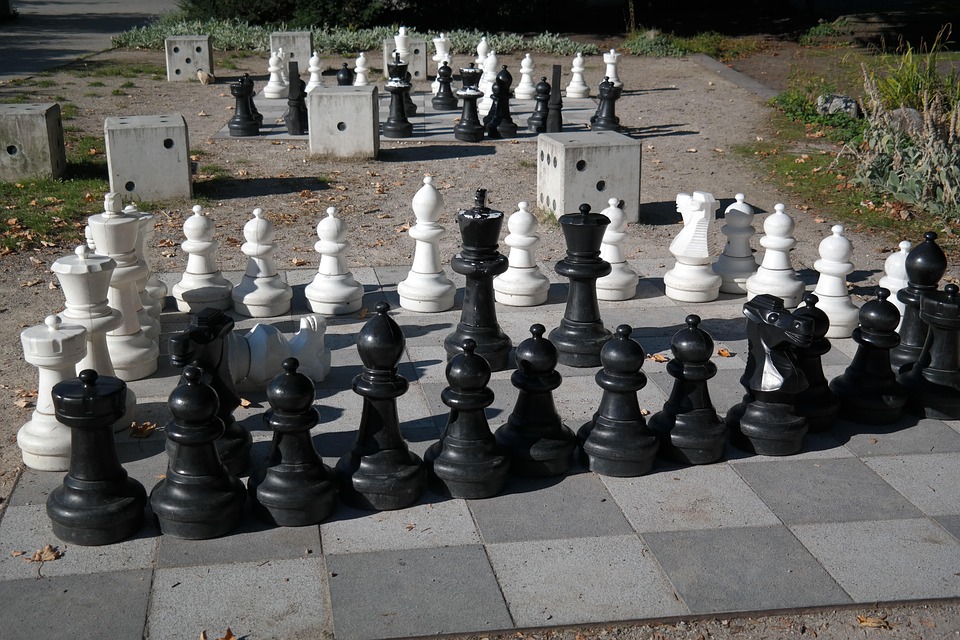Chess online opens up a world of strategic possibilities where players can engage with opponents from around the globe. With a variety of platforms available, each offering unique features, the online chess scene caters to everyone from novices to grandmasters. Understanding these diverse platforms is essential for any aspiring chess player looking to enhance their skills and enjoy this timeless game in a modern setting.
From user-friendly interfaces to advanced analytics tools, online chess platforms not only facilitate gameplay but also foster a thriving community of enthusiasts. Whether you’re exploring competitive tournaments or seeking informal matches, the digital chess landscape offers endless opportunities to learn and grow.
Online Chess Platforms

Online chess platforms have transformed the way enthusiasts engage with the game, making it accessible to players of all skill levels from anywhere in the world. These platforms offer a variety of features, including live play, puzzles, lessons, and community interaction, which enhance the overall chess experience. The rise of technology has enabled players to learn, compete, and socialize in ways previously unimaginable.
Understanding the different online chess platforms available is essential for players looking to find the right fit for their playing style and needs. The top platforms not only differ in their user interface but also in the functionalities they provide, creating a diverse environment for chess lovers. Below is a detailed comparison of the leading platforms.
Top Online Chess Platforms and Their Features
The following platforms are recognized for their exceptional services and features in the chess community. Here’s a comparison of these platforms, highlighting their standout functionalities:
| Platform | Features | User Experience | Mobile Accessibility |
|---|---|---|---|
| Chess.com | Live games, puzzles, lessons, articles, forums | User-friendly interface, strong community | Available on iOS and Android |
| Lichess | Open source, various game modes, puzzles, analysis tools | Clean design, ad-free experience | Available on mobile browsers |
| Internet Chess Club (ICC) | Live tournaments, video lectures, analysis | Traditional chess atmosphere | Limited mobile support |
| PlayMagnus | Play against an AI mimicking Magnus Carlsen | Unique AI experience, engaging for fans | Available on iOS and Android |
| FIDE Online Arena | Official FIDE ratings, online tournaments | Focus on competitive play | Available on mobile browsers |
The registration process across different platforms is generally straightforward, but each platform has its unique steps and requirements. Here’s a summary of the user registration processes for these platforms:
User Registration Process Across Different Platforms
Initiating your chess journey on these platforms often involves simple registration steps. Below are the processes for each platform:
- Chess.com: Users can register using an email address or through social media accounts. The process includes creating a username and password, with an option for subscription plans.
- Lichess: Registration is optional but can be done with an email address. Users can also play anonymously without an account, making it accessible for casual players.
- Internet Chess Club (ICC): Registration requires filling out a form with personal information and payment details for subscription. A free trial may be available for new users.
- PlayMagnus: Users must create an account using an email address. Registration can be expedited through social media sign-ups.
- FIDE Online Arena: Registration involves filling out a detailed form, including personal information and payment for official membership if desired.
These platforms cater to various player needs, providing a comprehensive environment to play, learn, and grow in the world of chess. The choice of platform depends on individual preferences regarding features, community, and accessibility, paving the way for a rich chess experience.
Chess Strategies for Online Play
In the realm of online chess, players encounter a diverse range of opponents, each with unique skill levels and strategies. Developing effective strategies is essential to gaining a competitive edge and enhancing your overall gameplay. By understanding various approaches, players can adapt their tactics to suit their opponents, thereby increasing their chances of victory.
One effective strategy for online play is the importance of adaptability. Players must evaluate their opponent’s style and adjust their tactics accordingly. For example, if facing an aggressive opponent, it may be wise to prioritize solid defensive plays and wait for opportunities to counterattack. Conversely, against a more passive player, initiating an aggressive strategy can put pressure on them and potentially force mistakes. Timing and patient observation often make the difference in a closely contested match.
Common Openings and Their Advantages
Familiarizing yourself with common chess openings is crucial as they lay the foundation for the middle game. Each opening serves unique advantages, allowing players to control the board early on. Below are some popular openings and their benefits:
- Italian Game: This opening promotes rapid piece development and control of the center, leading to potential tactical advantages.
- Sicilian Defense: A popular choice for Black, this opening allows for counterplay and asymmetrical positions, often leading to dynamic game scenarios.
- French Defense: This opening is effective in creating a strong pawn structure for Black while enabling counterattacking chances against White’s central control.
- Queen’s Gambit: This opening provides White with strong central control and development opportunities, facilitating aggressive play in the early game.
- Ruy Lopez: This classic opening aims to control the center and develop pieces harmoniously while applying pressure on Black’s position.
Understanding these openings allows players to quickly navigate the early stages of the game, establishing favorable positions that can be leveraged later.
Methods for Analyzing Games and Improving Performance, Chess online
Analyzing past games is a critical step in enhancing performance and identifying areas for growth. Various methods can be utilized to dissect games effectively:
1. Reviewing Game Records: Use online platforms to access game history, including time spent on moves and specific decisions made during play. This data provides insight into decision-making patterns.
2. Utilizing Analysis Tools: Many online chess platforms offer analysis engines that evaluate game moves, highlighting mistakes and suggesting better alternatives. Employing these tools can significantly enhance understanding.
3. Studying Opponent Patterns: Pay attention to recurring strategies and tendencies exhibited by opponents. Understanding their preferred openings and endgame techniques can provide a tactical advantage in future encounters.
4. Engaging in Post-Game Discussions: Participation in online forums or communities allows players to gain perspectives from others, helping to refine strategies and learn new concepts.
5. Practicing with Puzzles: Regularly solving chess puzzles can sharpen tactical awareness and improve decision-making skills during actual games.
By implementing these methods, chess players can continuously refine their skills, learn from their mistakes, and develop a more nuanced understanding of the game.
Community and Events in Online Chess
Online chess has evolved significantly, creating a vibrant community that caters to players of all skill levels. Online forums and communities provide players with opportunities to discuss strategies, share experiences, and foster friendships through their shared love for the game. These platforms serve as an essential resource for player development, allowing individuals to learn from each other, receive feedback, and enhance their skills within a supportive environment.
The role of online chess communities extends beyond casual discussions; they are instrumental in enhancing the overall chess experience. Players can engage in forums to analyze games, participate in discussions about openings, and share personal experiences. Such interactions lead to a deeper understanding of the game and help players stay motivated and challenged.
Upcoming Online Chess Tournaments and Events
Participating in tournaments is crucial for players wishing to test their skills and gain exposure to different playing styles. Upcoming online chess events provide an excellent platform for players to compete, learn, and grow. Here are some notable tournaments to look forward to:
- World Online Chess Championship – Scheduled for February 2024, this prestigious event brings together the best talents from around the globe.
- Chess.com Blitz Championship – Taking place in March 2024, this championship features rapid-fire games with time controls that challenge even the most skilled players.
- FIDE Online Arena Tournaments – Monthly tournaments hosted throughout the year, allowing players to compete for titles and ratings.
- US Chess League Online Cup – An ongoing series of matches throughout the year, perfect for players looking for competitive team experiences.
- Rapid Chess Festival – October 2024 will see a gathering of amateur and professional players engaging in rapid chess matches, fostering competitive spirit and camaraderie.
These tournaments not only provide competitive opportunities but also create a sense of community, bringing players together to share their passion for chess.
Joining or Forming Online Chess Clubs
Engaging with others in an online chess club can significantly enhance a player’s skills and provide a structured environment for regular practice. Clubs offer scheduled games, discussions, and resources that can uplift participants’ chess abilities. Here’s a guide on how to join or form an online chess club:
1. Finding Existing Clubs: Use platforms like Chess.com, Lichess.org, or chess forums to search for clubs that match your interests and skill level. Most platforms have a dedicated section for clubs where you can see ongoing activities and membership details.
2. Joining a Club: Once you find a club, simply follow the platform’s instructions for membership. This typically involves clicking a “Join” button and possibly filling out a brief application or responding to club rules.
3. Creating Your Own Club: If you can’t find a suitable club, consider starting your own. Choose a platform that allows club creation, set up guidelines, and promote your club through social media or chess forums to attract members.
4. Organizing Club Activities: Regular practice sessions, tournaments, and strategy discussions can keep members engaged. Schedule weekly or bi-weekly meetings online where members can play games or analyze positions together.
5. Utilize Resources: Encourage members to share resources like articles, videos, and books that can help improve collective skills. Utilizing tools like online analysis boards can also facilitate discussions on various strategies.
Online chess clubs not only provide a structured way to practice and learn but also foster lasting friendships and a sense of belonging within the global chess community.
Final Wrap-Up: Chess Online

In conclusion, chess online is not just about playing games; it’s about immersing yourself in a vibrant community while continuously honing your skills. By leveraging various platforms, adopting effective strategies, and participating in online events, players can transform their chess experience into a fulfilling journey of development and camaraderie. Embrace the challenge and let the digital chessboard become your arena for growth.

